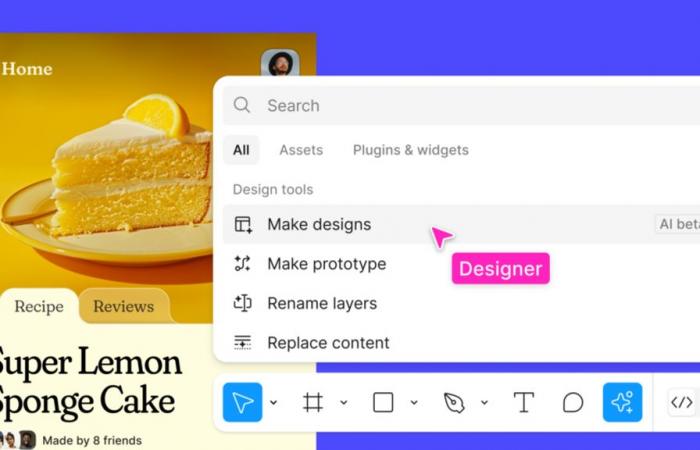A year after promising to add a layer of general artificial intelligence, Figma unveiled on Wednesday June 26 its first features that should make designers’ jobs easier. “AI should allow you to avoid obstacles,” promises Dylan Field, its founder and managing director, at the opening of the Config conference organized this week by the start-up in San Francisco. While recognizing that “This is just the beginning”.
Called Figma AI, this toolbox is currently only available in the beta phase, first limited to a limited number of users then gradually extended. However, the company does not indicate any date for a launch to all of its customers, nor the price of the supplement that will be billed to them. “We still have no idea of the associated costs,” justifies Dylan Field.
Aborted takeover by Adobe
Founded in 2012 but officially launched four years later, Figma is a collaborative platform, accessible from a browser, for the design and prototyping of web and mobile applications. It has more than 4 million users, free and paid – a figure that it does not confirm. Microsoft, Google, Salesforce, Spotify, Airbnb and Uber are among its clients. In France, this is the case for Carrefour, Société Générale, Canal+ and Doctolib.
In 2020, Figma accepted a takeover offer from the giant Adobe for an amount of $20 billion, a record sum for a software publisher that is not listed on the stock exchange. But the operation was abandoned at the end of 2023, due to opposition from the competition authorities. “This has not changed anything on our roadmap”however assures Yuhki Yamashita, the product director of Figma.
AI-generated design
Concretely, Figma AI will allow to automatically generate the design of a website or an application from a simple prompt, relying on the language and diffusion models of OpenAI combined with a library of instructions powered by Figma. To improve the results, the start-up plans to use the designs created by its customers as training data. It will however be possible to refuse.
This tool should make it possible to lower the barriers to entry for the two thirds of the platform’s users who are not designers. But they have also been designed to support professionals in the field, by allowing them to very quickly test several ideas or iterations before launching.
The company promises to go even further. It is working in particular with Google to add elements of its “material design” to be able to create models of Android applications using AI. It also wants to allow its clients to generate interfaces using their own elements and their usual design codes.
Facilitate internal search
With Figma AI, users will also be able to create illustrative photos or filling texts. They will also be able to translate their creations into several languages to ensure that they are well suited to different text lengths. The AI will also be able to name the layers. And it will allow you to easily generate prototypes by automatically creating links between the different pages.
Finally, Figma leverages AI to facilitate internal search, especially for large organizations. With a prompt, a user will be able to find a layer or a page. He can also draw an icon to easily retrieve it. Secondly, the search function will be extended to elements and designs created by the community.
In addition to AI, the San Francisco start-up presented improvements for its “Dev mode”. This was introduced last year to facilitate the work of developers by generating snippets of code corresponding to design elements ready for the production phase. This tool can now draw on the code already written by developers to offer them code that corresponds to their habits.
Figma Slide, for presentations
Latest announcement: the launch of Figma Slide, which allows you to create presentations. The company claims to respond to a use that already exists among its users. This new tool stands out from the competition by the ability to easily add designs created on the platform and also functional prototypes. The service is currently free but will become payable next year (between 3 and 5 dollars per month).
After “Dev Mode” and Figjam, a collaborative whiteboard for brainstorming, Slides is the third additional product offered by Figma. “We are considering launching others to create a real software suite”, said Yuhki Yamashita.
Selected for you







